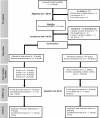Feasibility and preliminary effects of a socio-spiritual intervention for adults with cancer and their family caregivers: a pilot randomised controlled trial
- PMID: 40259903
- PMCID: PMC12010129
- DOI: 10.3332/ecancer.2025.1851
Feasibility and preliminary effects of a socio-spiritual intervention for adults with cancer and their family caregivers: a pilot randomised controlled trial
Abstract
Background: Despite significant psychosocial-spiritual needs adversely affecting the health-related quality of life (HRQoL) of adults living with cancer and their family caregivers in sub-Saharan Africa, there is a dearth of culturally tailored interventions to address these needs. This study evaluates the feasibility of a socio-spiritual intervention designed for adults with cancer and their family caregivers in sub-Saharan Africa, and preliminarily examines its impact on family/social support, spiritual needs, information needs, health literacy and HRQoL.
Methods: This study employed a single-site randomised controlled trial design. Eighty-eight dyads were randomly assigned to either a socio-spiritual intervention (n = 44 dyads) or usual care (n = 44 dyads). The intervention group participated in a 4-week face-to-face training programme with usual care, whereas the control group received only usual care over the same period.
Result: A total of 82 dyads completed the study (40 dyads in the intervention group and 42 dyads in the control group). The eligibility and acceptance rates were >85%, retention was >90% and treatment fidelity was high (between 88.5% and 94.6%). In terms of intervention effects, the intervention was helpful in reducing needs and improving HRQoL of adults with cancer (F (13, 65) = 24.50, p < 0.001; Wilks' Lambda = 0.17) and their family caregivers (F (13, 65) = 14.27, p < 0.001; Wilks' Lambda = 0.26).
Conclusion: This pilot study established the feasibility of a face-to-face training programme for adults with cancer and their families, as well as its potential for improving HRQoL of this population.This study's findings imply that by supporting individuals with cancer and their family caregivers as a unit of care, both individual needs and components of HRQoL can be maintained or even improved. In current practice in Nigeria, only patients' needs are routinely addressed; caregivers often are left on their own to obtain information and support to deliver complex care in the home.
Keywords: cancer patient; effects; family caregiver; feasibility; informal caregiver; intervention; quality of life; socio-spiritual; unmet needs.
© the authors; licensee ecancermedicalscience.
Conflict of interest statement
The authors have declared that they have no possible conflicts of interest in connection with the research, authorship or publication of this paper.
Figures
Similar articles
-
Feasibility of a socio-spiritual intervention to improve quality of life of adult Nigerians with cancer and their family caregivers: Protocol for a randomised controlled trial.Contemp Clin Trials Commun. 2021 Jun 16;22:100802. doi: 10.1016/j.conctc.2021.100802. eCollection 2021 Jun. Contemp Clin Trials Commun. 2021. PMID: 34195469 Free PMC article.
-
The effects of a family-centered psychosocial-based nutrition intervention in patients with advanced cancer: the PiCNIC2 pilot randomised controlled trial.Nutr J. 2021 Jan 2;20(1):2. doi: 10.1186/s12937-020-00657-2. Nutr J. 2021. PMID: 33388075 Free PMC article. Clinical Trial.
-
Remotely delivered information, training and support for informal caregivers of people with dementia.Cochrane Database Syst Rev. 2021 Jan 4;1(1):CD006440. doi: 10.1002/14651858.CD006440.pub3. Cochrane Database Syst Rev. 2021. PMID: 33417236 Free PMC article.
-
Effects of family participatory dignity therapy on the psychological well-being and family function of patients with haematologic malignancies and their family caregivers: A randomised controlled trial.Int J Nurs Stud. 2021 Jun;118:103922. doi: 10.1016/j.ijnurstu.2021.103922. Epub 2021 Mar 4. Int J Nurs Stud. 2021. PMID: 33812296 Clinical Trial.
-
Telephone interventions, delivered by healthcare professionals, for providing education and psychosocial support for informal caregivers of adults with diagnosed illnesses.Cochrane Database Syst Rev. 2019 May 14;5(5):CD012533. doi: 10.1002/14651858.CD012533.pub2. Cochrane Database Syst Rev. 2019. PMID: 31087641 Free PMC article.
References
LinkOut - more resources
Full Text Sources

